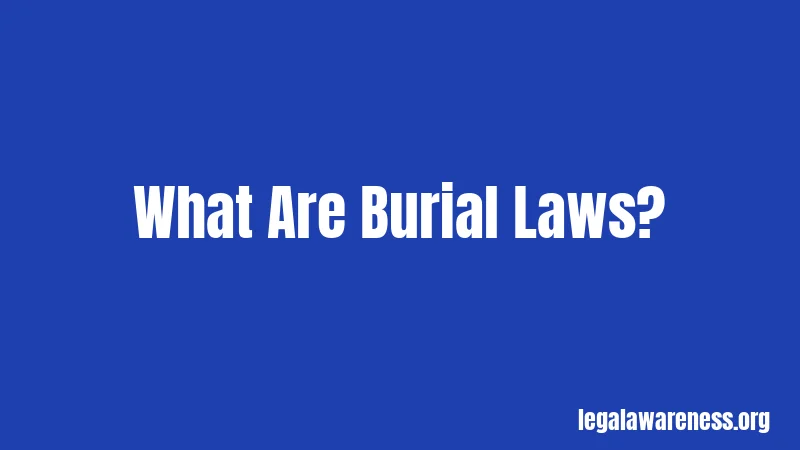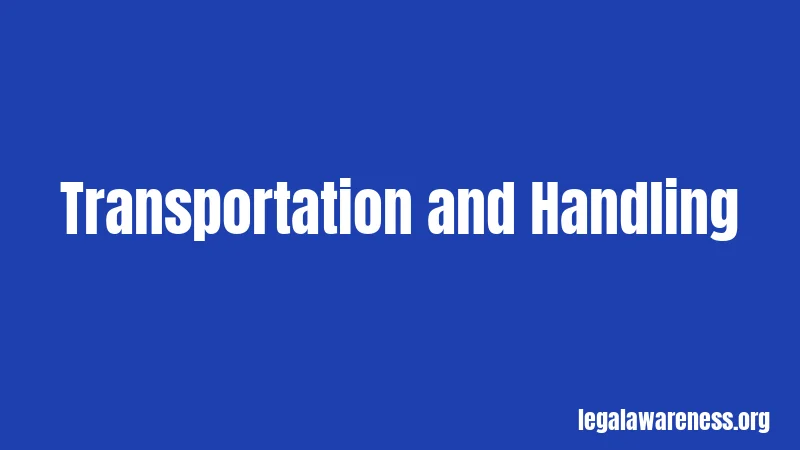Burial Laws in Florida (2026): Your Complete Rights Guide
Most people don’t realize how flexible Florida actually is when it comes to burial. Seriously. You have more options than you might think. But there are still rules you need to follow, and the penalties for breaking them can hit hard.
Let’s break down exactly what you need to know about burial laws in Florida.
What Are Burial Laws?

Burial laws are the rules that control how you handle human remains after someone dies. They cover everything from where you can bury someone to how you transport a body. These laws exist to protect public health and make sure everyone treats the deceased with dignity.
In Florida, the rules are actually pretty reasonable. The state gives you quite a bit of freedom compared to other places. But don’t assume you can do whatever you want.
Basic Burial Requirements
Death Certificates Come First
You can’t just bury someone without paperwork. Florida requires a death certificate to be filed within five days of death. This happens before any burial or cremation can take place.
Here’s how it works. A doctor or medical examiner fills out the cause of death information. They have 72 hours to complete their part. Then the funeral director or family member files the complete certificate with the local registrar.
Wondering if you can handle this yourself? Yes, you can. Florida doesn’t require you to use a funeral director for this process.
The Burial-Transit Permit
After the death certificate is filed, you need a burial-transit permit. This permit allows you to move the body for burial or cremation. The county registrar issues it once they receive the death certificate.
There’s no fee for this permit. Pretty straightforward. But you absolutely need it before moving a body anywhere.
Embalming Rules
Florida doesn’t require embalming in most cases. But here’s the catch. If you don’t bury or cremate within 24 hours, you must either embalm or refrigerate the body.
Refrigeration or dry ice works fine for short-term preservation. Most families choose this option to avoid embalming costs.
Home Burial on Private Property

Hold on, this part is important. Florida actually allows home burials. No state law prohibits burying someone on your own land.
Family Cemetery Requirements
You can establish a family cemetery on property less than two acres. The key rule? You cannot sell burial spaces or burial rights to anyone else. This keeps it truly a family cemetery.
Sound complicated? It’s actually not. Many families in rural Florida have maintained family cemeteries for generations.
Check Your Local Zoning
Here’s where it gets tricky. While state law allows home burials, your county or city might have different rules. Local zoning ordinances can restrict where and how you bury someone.
You need to check with your local zoning board before planning a home burial. Some areas require permits. Others might not allow burials at all in certain zones. Don’t skip this step.
Property Value Considerations
Honestly, think about future property sales. Some buyers might not want to purchase land with human remains buried on it. This could affect your property’s value down the road.
Not sure what to do? Consider how long your family plans to keep the property. If it’s staying in the family for generations, a home burial might make perfect sense.
Cemetery Burial Standards
Grave Space Dimensions
Florida sets minimum sizes for grave spaces. A standard adult grave must be at least 42 inches wide and 96 inches long. The soil covering the burial container must be at least 12 inches deep from the top of the container.
You can waive the 12-inch minimum if you’re the legally authorized person. But most cemeteries stick to these standards anyway.
Cemetery Regulations
Licensed cemeteries in Florida follow strict rules. They must maintain records of all burials. They need to track burial locations and ownership rights. This protects families and prevents confusion years later.
Transportation and Handling

Container Requirements
When transporting a body, you need a proper container. Florida law requires containers that prevent fluid seepage and escape of offensive odors. This makes sense for public health reasons.
The container doesn’t need to be fancy. It just needs to be adequate for the purpose. Many families use simple cardboard or wood containers for direct burial.
Burial-Transit Permit Must Accompany the Body
The burial-transit permit must travel with the body. Whether you’re moving remains across town or across state lines, that permit needs to be with the body at all times.
Cremation Rules
Waiting Period
Florida requires a 48-hour waiting period before cremation. This gives the medical examiner time to determine the cause of death. The medical examiner must approve cremation before it happens.
Written Authorization Required
You need written authorization from the legally authorized person before cremating anyone. Usually this is the spouse, adult child, or whoever the deceased designated in writing.
What Happens to Unclaimed Ashes
If cremated remains aren’t claimed within 120 days, the crematory can dispose of them. They can use any legally permitted method. But first, they must check if the remains belong to a veteran who could be buried in a national cemetery.
Scattering Ashes
No State Restrictions
Florida has no state laws restricting where you can scatter ashes. You can scatter them on your own private property without any permits.
Want to scatter on someone else’s private land? Get permission from the landowner first. This is just common courtesy and avoids legal problems.
Public and Federal Land
Check local regulations before scattering ashes on city or county public land. Many people do it quietly without asking, but technically you should verify the rules.
For federal land, you should request permission. For scattering at sea, stay at least three nautical miles from land.
Who Can Make Burial Decisions
Florida law determines who gets to make final arrangements. Here’s the priority order:
The deceased person’s written instructions come first. Your surviving spouse is next, unless they’re criminally responsible for your death. Then it goes to your adult children. If you have multiple children, the majority decides.
After that, it’s your parents, then your siblings, then other relatives. If none of those exist, it goes to your guardian, personal representative, or public administrator.
This hierarchy prevents family disputes. Know where you stand in this order if you’re making arrangements.
Penalties for Breaking the Law
Disturbing Graves or Human Remains
This is serious. Willfully disturbing human remains is a third-degree felony in Florida. That includes damaging tombstones, monuments, or anything marking a burial site.
What does third-degree felony mean? Up to five years in prison. Up to $5,000 in fines. This isn’t a slap on the wrist.
What Counts as Disturbing
Destroying or damaging any tomb, gravestone, or burial mound is illegal. Removing human remains without authorization is illegal. Even damaging trees, shrubs, or fences around a burial site can get you charged.
The law includes unmarked human burials too. If you discover human remains during construction or excavation, you must notify law enforcement immediately.
Second-Degree Felony for Excavating
Excavating or moving the contents of a grave is even more serious. This is a second-degree felony. That means up to 15 years in prison and up to $10,000 in fines.
There are exceptions for licensed funeral directors with proper permits. Cemetery operators can also move remains under specific circumstances with written authorization.
Failing to Report Disturbed Remains
If you know an unmarked burial is being disturbed and you don’t report it, that’s a second-degree misdemeanor. The penalties are lighter, but it’s still a crime.
Special Circumstances
Access Rights to Cemeteries
Family members and descendants have legal rights to access burial sites. Even if a cemetery is on private property, relatives can enter at reasonable times to visit or maintain graves.
If the property owner refuses access, contact your local sheriff’s office. The law protects your right to visit your family’s graves.
Abandoned Cemeteries
Florida has thousands of abandoned cemeteries. These are old burial grounds that haven’t been maintained in years. Counties and cities can maintain these cemeteries and recover the costs from property owners.
If you discover an abandoned cemetery on your property, contact your local historical resources office. They can help you understand your responsibilities.
Moving Existing Graves
Only a licensed funeral director can legally move human remains. They need a valid burial-transit permit to do it. This process is called disinterment.
Moving graves usually requires permission from descendants. It’s complicated and expensive. Most people avoid it unless absolutely necessary.
How to Comply with Florida Burial Laws
For Home Burials
First, check your local zoning ordinances. Call your county planning department and ask specifically about home burials. Get any requirements in writing.
File the death certificate within five days. Obtain the burial-transit permit from your county registrar. Make sure your property is less than two acres if you’re establishing a family cemetery.
Don’t sell burial rights to anyone outside your family. Keep records of who is buried where. Future generations will thank you.
For Traditional Cemetery Burials
Choose a licensed cemetery. They’ll handle most of the legal requirements for you. You’ll still need the death certificate and burial-transit permit, but the funeral director typically manages this.
Review the cemetery’s rules about headstones, flowers, and decorations. Each cemetery sets its own policies.
For Cremation
Find a crematory willing to work with families if you’re not using a funeral director. Not all crematories accept direct family arrangements.
Wait the required 48 hours. Get the medical examiner’s approval. Have the legally authorized person sign the cremation authorization form.
Decide what you’ll do with the ashes before the cremation. You have 120 days to claim them.
Recent Changes and Updates
Florida switched to an electronic death registration system, but paper certificates are still available. This makes the process faster for most people.
The law expanded protections for veteran remains in 2024. Funeral homes must now make reasonable efforts to identify unclaimed cremated remains that might belong to veterans. If they are veteran remains, the funeral home arranges burial in a national cemetery.
Frequently Asked Questions
Can I be buried on my own property in Florida? Yes, Florida allows burial on private property under two acres without selling burial rights. Check your local zoning laws first, as some counties have additional restrictions.
Do I need to use a funeral director in Florida? No, Florida doesn’t require a funeral director for home funerals or family burials. You can handle death certificates and burial permits yourself if you choose.
How long do I have to file a death certificate? You must file the death certificate within five days of death and before any burial or cremation takes place. The doctor has 72 hours to complete the medical portion.
Is embalming required in Florida? No, embalming isn’t required unless final disposition doesn’t occur within 24 hours. You can use refrigeration or dry ice instead.
Where can I scatter cremated ashes in Florida? You can scatter ashes anywhere in Florida with no state restrictions. Get permission for private property, check local rules for public land, and stay three nautical miles offshore for ocean scattering.
Final Thoughts
Florida gives you real freedom when it comes to burial choices. You can bury on your own land. You can handle arrangements without a funeral director. You can scatter ashes pretty much anywhere with permission.
But don’t skip the important stuff. File that death certificate on time. Get your burial-transit permit. Check your local zoning laws before planning a home burial. Respect existing graves and burial sites.
The penalties for violations are serious. Third-degree felonies mean real prison time. It’s not worth the risk.
Now you know the basics. Stay informed, follow the rules, and treat human remains with the dignity they deserve. When in doubt, contact your local health department or consult with a licensed funeral director.
